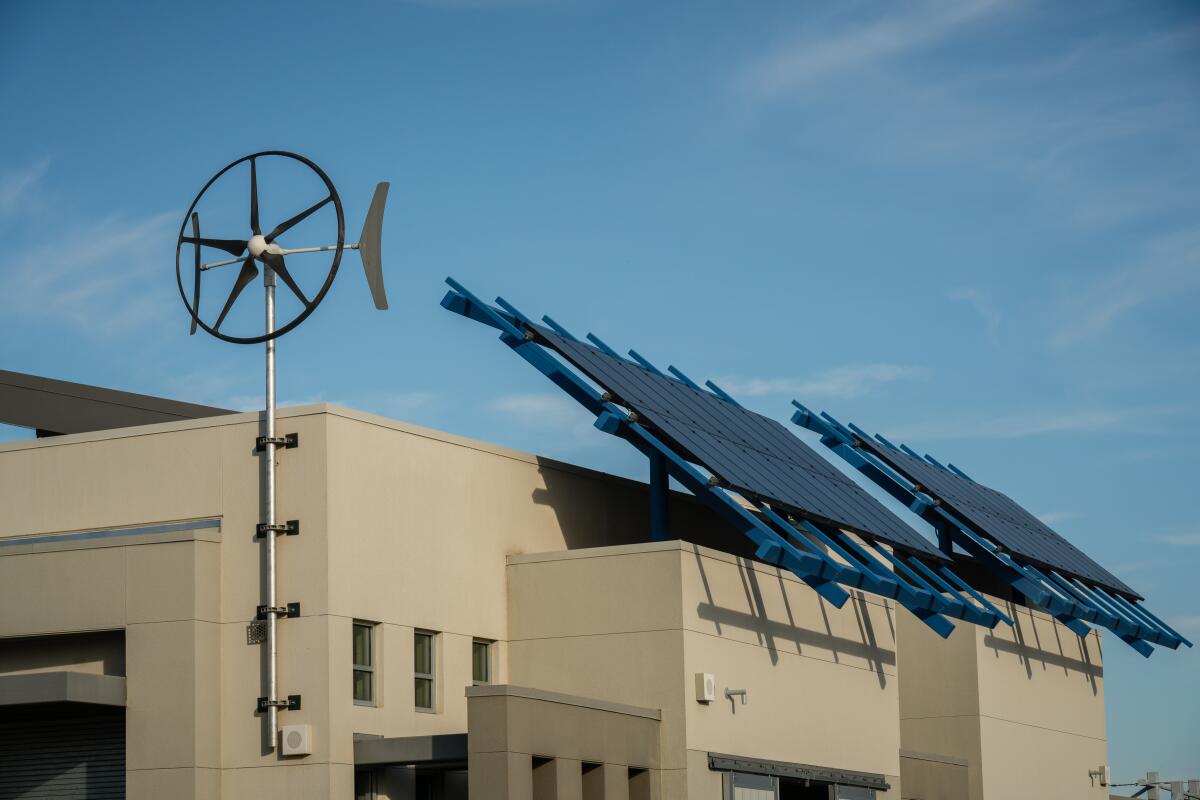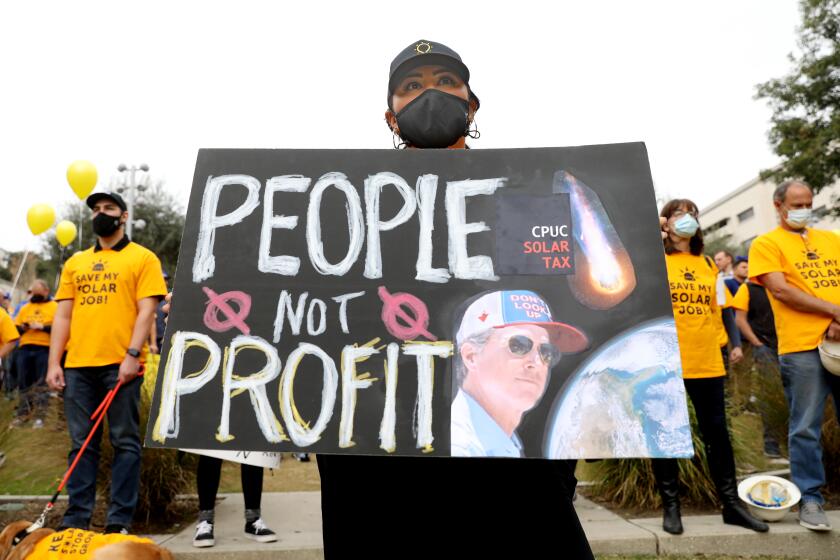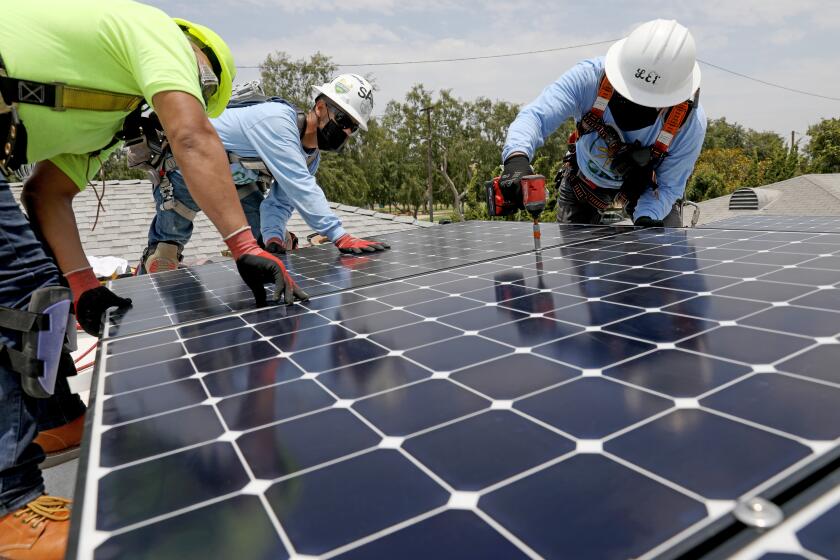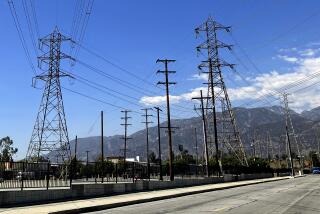Op-Ed: Slashing California’s solar incentives would hurt low-income communities

California has long been a national leader on clean energy and climate change. That’s why it’s such a disappointment to see the California Public Utilities Commission considering a proposal it claims will promote equity, when in fact the changes would make it harder for residents, businesses, houses of worship and other establishments to afford rooftop solar.
The proposal, set for a decision in the coming weeks, would dramatically weaken the state’s popular net energy metering program, cutting the credits on electric bills for the excess power generated by rooftop solar systems by up to 80%. It would also require solar owners in many communities to pay utilities a monthly “grid participation charge” averaging $48, which would be the highest such fees in the nation.
Clean energy advocates want Gov. Gavin Newsom to protect the net metering program.
We are not opposed to modernizing solar incentives as the market changes. The utilities commission says changes are necessary to ensure that solar customers are doing their part to maintain the grid, and to prevent a cost shift for maintaining solar onto non-solar energy users, including low-income residents. But the current proposal will reduce the value of solar for low-income residents, too.
A veteran energy economist who has represented utilities in net metering battles across several states called the proposal “extremely radical,” and Gov. Gavin Newsom said this month that “changes need to be made” to the plan.
The end result of any rooftop solar proposal should be continuing to expand access, especially for low-to-moderate income residents. Instead, the commission’s plan is at odds with its stated intention of equity. It would make it more expensive for lower- and middle-income Californians to go solar. The different credits, fees, exemptions and phaseouts — which vary on factors such as your location and when you use electricity — are hard for most people to understand. If customers can’t understand it, and the value is not there, they’re not going to invest in solar power.
In 2019, 42% of California households that installed solar had low-to-moderate incomes, up from about 35% in 2010. We must build on that progress, not turn backward.
We share the state’s concerns about rising electricity bills, caused largely by huge increases in transmission and grid expenses and ballooning costs associated with wildfires. Both factors are likely to escalate with the climate crisis. Pacific Gas & Electric, for example, announced it will invest billions to prevent transmission lines from sparking wildfires, as heat waves and record droughts push our power grid to the brink every summer.
Rooftop solar helps to reduce the need for expensive transmission lines, and, when paired with batteries that store solar energy for use at night, it can keep the lights on during grid failures, which are increasingly common thanks to extreme weather.
Low-income communities and communities of color continue to bear the brunt of the climate crisis and fossil fuel pollution, paying with our health and far too often our lives. Rooftop solar installations in urban areas can reduce air pollution and provide economic opportunities for small and minority-owned businesses, as well as jobs for local residents. More than 600 California organizations, community leaders and mayors are calling on the CPUC to maintain a net metering program that promotes rooftop solar.
Gov. Gavin Newsom’s administration is preparing to make it harder for Californians to go solar. That’s OK, but regulators would be unwise to gut one of the state’s most popular and successful renewable energy programs.
One of us knows about creating green jobs in disadvantaged communities, having grown up in Compton under difficult circumstances, moved up in the solar industry and started a company in Compton committed to not just clean energy but also to community revitalization and providing opportunities for others. The commission’s proposal on net metering threatens those efforts. Small businesses will struggle to survive the complicated rules and bad economics of the changes.
The other one of us, as the congresswoman representing Compton and other low-income and working-class communities of color in South Los Angeles County, is dedicated to ending environmental racism and promoting community-led climate solutions. The new plan would undermine those goals.
One climate solution, for example, is deploying solar panels and batteries to disadvantaged communities to reduce pollution. While the new proposal would offer a rebate for energy storage through battery use, consumers won’t buy batteries if the overall financial return for solar and storage isn’t there.
In the name of equity, economic opportunity and environmental justice, California must continue to expand rooftop solar in our communities, not constrain it with the most punitive solar policies in the nation.
Nanette Diaz Barragán represents California’s 44th Congressional District. Kenneth Wells is the founder and chief executive of O&M Solar Services.
More to Read
A cure for the common opinion
Get thought-provoking perspectives with our weekly newsletter.
You may occasionally receive promotional content from the Los Angeles Times.








